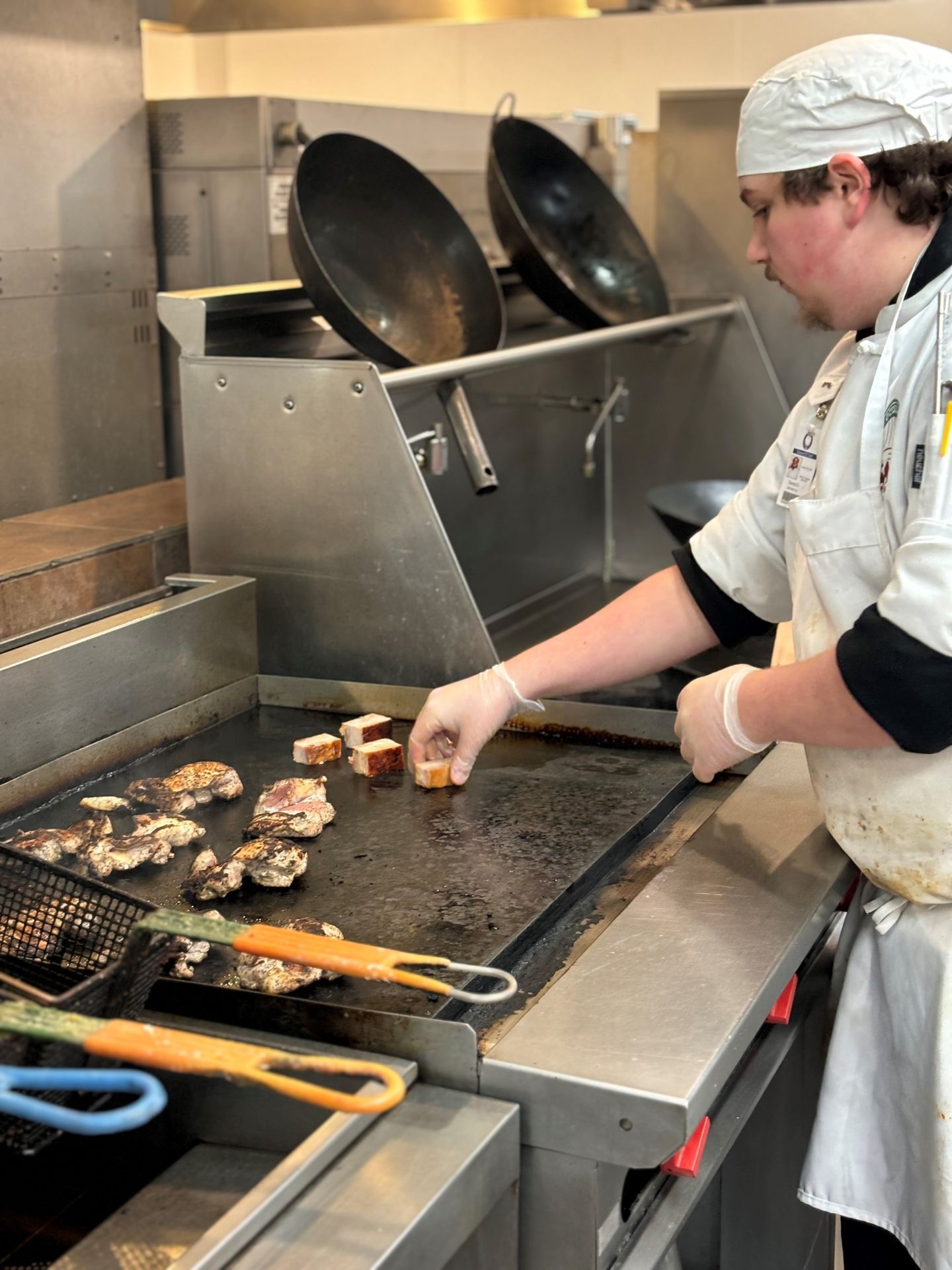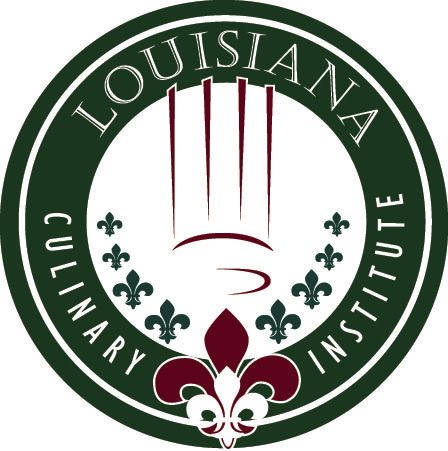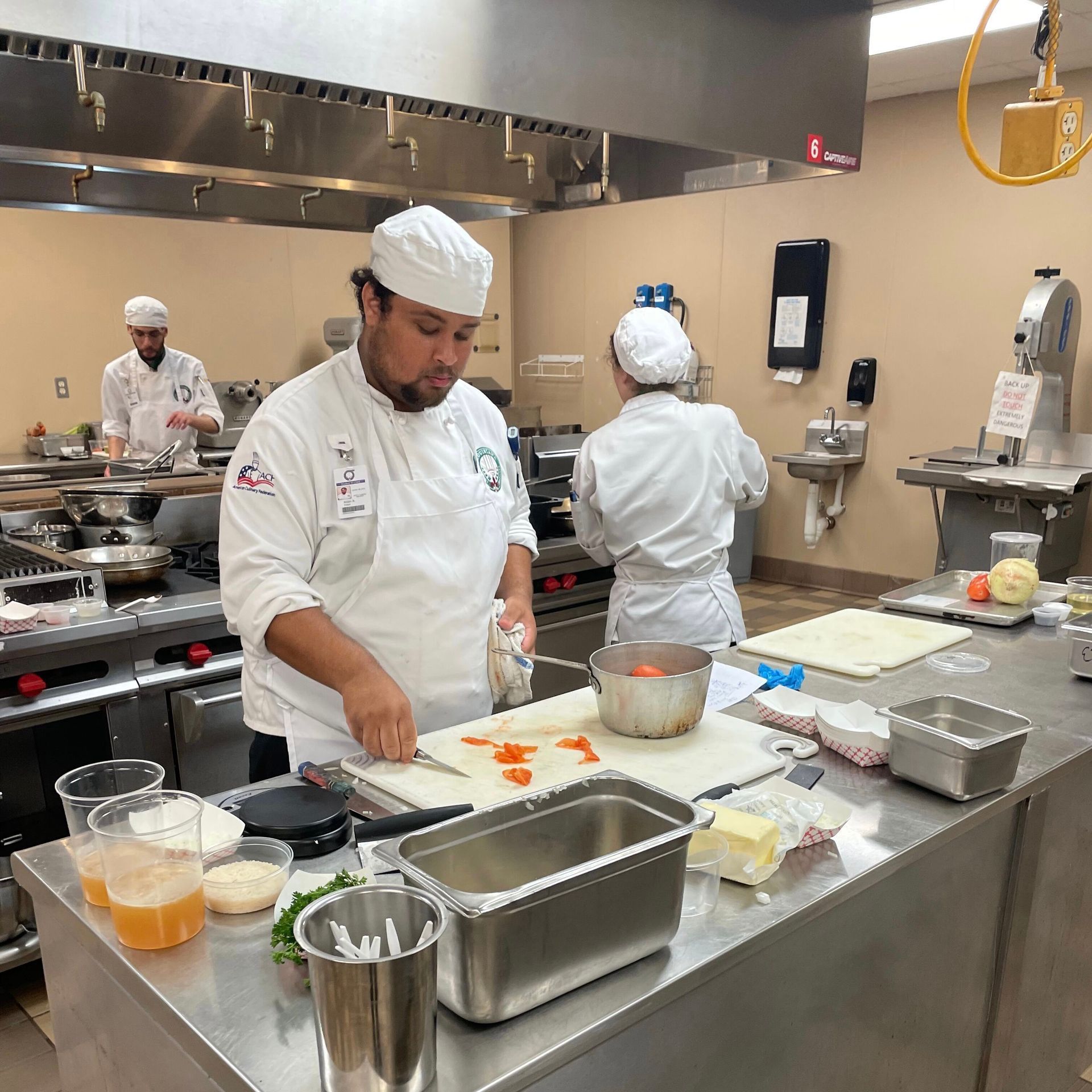Does Culinary School Prepare You to Become a Chef?: Exploring Your First Semester
Charlie Ruffolo • Aug 27, 2020
Becoming a professional chef
takes passion, creativity, focus, and skill. Establishing the foundation to develop these skills and gain the knowledge you need to grow begins with experience and education. Culinary school provides both of these essential ingredients, but how? Over the course of your time in culinary school, you will go through a curriculum that builds on the knowledge and skills you’ve learned in previous semesters and classes. Let’s take a closer look at the first semester of culinary school
at LCI.
APPLY
Your first semester at Louisiana Culinary Institute, also referred to as white level, is comprised of these different courses.
CA 111 – ServeSafe® Food Safety and Sanitation
This class will instruct you on the basic principles of sanitation and sanitary requirements following a HACCP program in receiving, storing, pre-preparation, cooking, and handling foods in a commercial kitchen. Special emphasis will be given to time, temperature control, cross contamination, and personal hygiene. This is the National Restaurant Association Educational Foundation’s (NRAEF) nationally recognized ServSafe® Course and is a Core Credential for the NRAEF ManageFirst Program®. You’ll be eligible to take the NRAEF certification test upon completion of this course to obtain the ServSafe® Sanitation Certification, which is valid for five years. This course is worth 2 semester hours.
CA 101 – Professional Cooking I
This course serves as an introduction to the history of French Classic Haute Cuisine. It teaches the fundamentals of professional cooking techniques using moist and dry methods in a commercial food service facility. You’ll also be introduced to basic nutrition and how to incorporate this into your dishes. The fundamentals or recipe writing and interpretation, as well as the different types of menus used in commercial food service will also be taught. This course is worth 2 semester credit hours.
CA 102 – Professional Cooking II
Professional Cooking II teaches the use and production of stocks, sauces, and soups. This includes the fundamentals of stock making and its specific techniques. After this class you’ll understand how to produce the five lead sauces using the stocks produced along with the production of clear, thick, and national soups. This course is worth 4 semester credit hours.
CA 103 – Professional Cooking III
This course will teach you the basics of meat, poultry, and seafood cookery. This includes learning how to identify the primal cuts of beef, lamb, veal, and pork, as well as a list of the fabricated cuts from each. You’ll also learn the proper handling and cooking of poultry, utilizing both dry and moist heat cooking methods, with an emphasis on the correct procedure used for the “slow roasting” of large birds. This course is worth 2 semester credit hours.
CA 104 – Professional Cooking IV
In this course you will learn the basics of vegetable and starch cookery. This includes learning how to identify, handle, process, and cook commonly used vegetables, starches, legumes, grains, and pasta, along with how to control texture, flavor, color changes, and nutrient loss. You will also learn the dynamics of vegetarian diets and how to plan nutritious vegetarian menus. This course is worth 4 semester credit hours.
CA 121 – Restaurant Production and Service I
This class in an introduction to the commercial kitchen. It includes how to use and work the equipment to practice pre-preparation techniques in learning mise en place. You will be taught how to prep food items for proper cooking and will be shown the proper techniques for using all commercial kitchen equipment safely. The proper use of knives will also be demonstrated with ample time allowed for you to practice knife cutting techniques. This course is worth 1 semester credit hour.
OR
CA 110 – Introduction to Baking and Pastry
In this course you will learn the fundamentals of bakeshop principles and to apply them in cakes, cookies, ice creams, sorbets, and pie production in a commercial bakery. This course is worth 2 semester credit hours.
MAT 101 – Essentials of Math
The course encompasses the basics of practical math. It will offer a comprehensive introduction to the concepts and applications of mathematics. This class provides the skills and competencies need to enter the workforce. This course is worth 3 semester credit hours.
These courses will provide the foundation you’ll need to excel in your future semesters. LCI provides an accelerated 16-month program that will prepare to become a professional chef.
Share
Tweet
Share
Mail

By Charlie Ruffolo
•
28 Mar, 2024
Pursuing an associate degree in culinary arts from LCI is a journey that leads to a solid foundation of culinary skills and knowledge. Our degree programs include access to opportunities where you will gain practical experience in professional kitchens and make industry connections.
About LCI | Calculator | Terms | Contact | Newsletter

